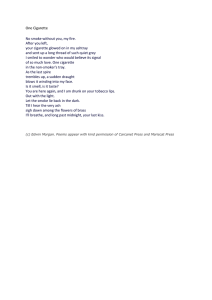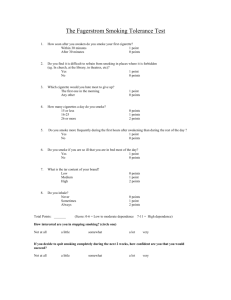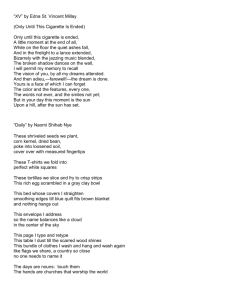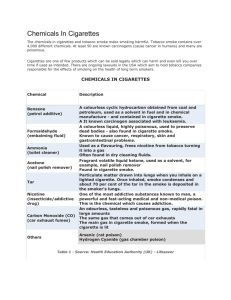Document 13310251
advertisement
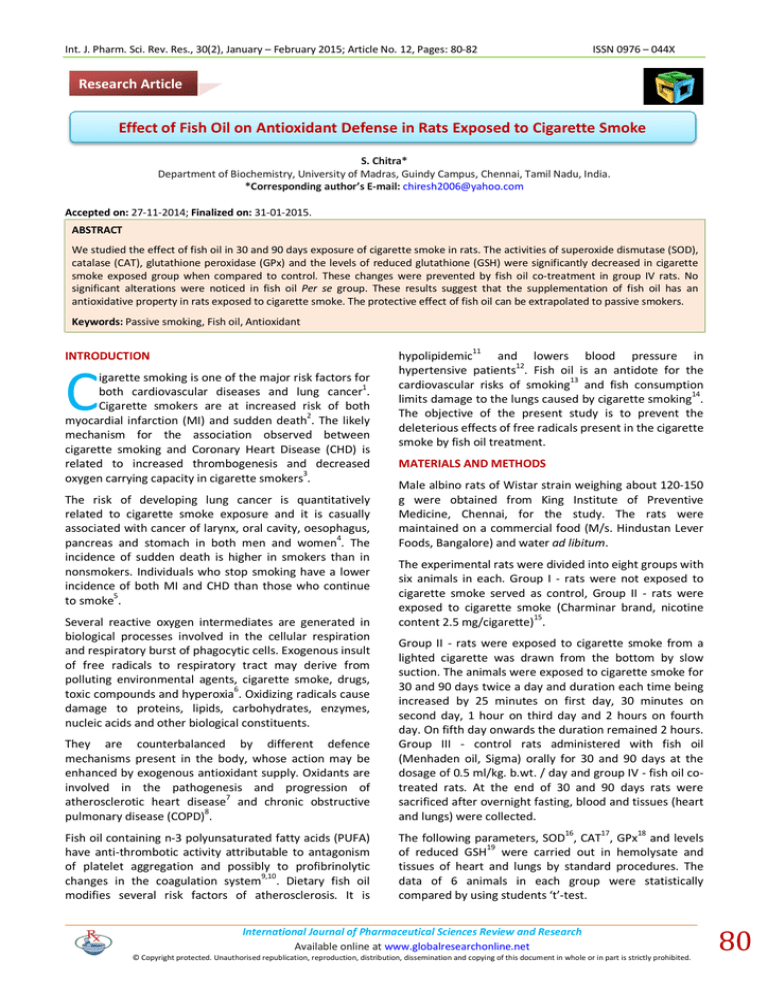
Int. J. Pharm. Sci. Rev. Res., 30(2), January – February 2015; Article No. 12, Pages: 80-82
ISSN 0976 – 044X
Research Article
Effect of Fish Oil on Antioxidant Defense in Rats Exposed to Cigarette Smoke
S. Chitra*
Department of Biochemistry, University of Madras, Guindy Campus, Chennai, Tamil Nadu, India.
*Corresponding author’s E-mail: chiresh2006@yahoo.com
Accepted on: 27-11-2014; Finalized on: 31-01-2015.
ABSTRACT
We studied the effect of fish oil in 30 and 90 days exposure of cigarette smoke in rats. The activities of superoxide dismutase (SOD),
catalase (CAT), glutathione peroxidase (GPx) and the levels of reduced glutathione (GSH) were significantly decreased in cigarette
smoke exposed group when compared to control. These changes were prevented by fish oil co-treatment in group IV rats. No
significant alterations were noticed in fish oil Per se group. These results suggest that the supplementation of fish oil has an
antioxidative property in rats exposed to cigarette smoke. The protective effect of fish oil can be extrapolated to passive smokers.
Keywords: Passive smoking, Fish oil, Antioxidant
INTRODUCTION
C
igarette smoking is one of the major risk factors for
both cardiovascular diseases and lung cancer1.
Cigarette smokers are at increased risk of both
myocardial infarction (MI) and sudden death2. The likely
mechanism for the association observed between
cigarette smoking and Coronary Heart Disease (CHD) is
related to increased thrombogenesis and decreased
oxygen carrying capacity in cigarette smokers3.
The risk of developing lung cancer is quantitatively
related to cigarette smoke exposure and it is casually
associated with cancer of larynx, oral cavity, oesophagus,
pancreas and stomach in both men and women4. The
incidence of sudden death is higher in smokers than in
nonsmokers. Individuals who stop smoking have a lower
incidence of both MI and CHD than those who continue
to smoke5.
Several reactive oxygen intermediates are generated in
biological processes involved in the cellular respiration
and respiratory burst of phagocytic cells. Exogenous insult
of free radicals to respiratory tract may derive from
polluting environmental agents, cigarette smoke, drugs,
6
toxic compounds and hyperoxia . Oxidizing radicals cause
damage to proteins, lipids, carbohydrates, enzymes,
nucleic acids and other biological constituents.
hypolipidemic11 and lowers blood pressure in
hypertensive patients12. Fish oil is an antidote for the
13
cardiovascular risks of smoking and fish consumption
limits damage to the lungs caused by cigarette smoking14.
The objective of the present study is to prevent the
deleterious effects of free radicals present in the cigarette
smoke by fish oil treatment.
MATERIALS AND METHODS
Male albino rats of Wistar strain weighing about 120-150
g were obtained from King Institute of Preventive
Medicine, Chennai, for the study. The rats were
maintained on a commercial food (M/s. Hindustan Lever
Foods, Bangalore) and water ad libitum.
The experimental rats were divided into eight groups with
six animals in each. Group I - rats were not exposed to
cigarette smoke served as control, Group II - rats were
exposed to cigarette smoke (Charminar brand, nicotine
content 2.5 mg/cigarette)15.
They are counterbalanced by different defence
mechanisms present in the body, whose action may be
enhanced by exogenous antioxidant supply. Oxidants are
involved in the pathogenesis and progression of
atherosclerotic heart disease7 and chronic obstructive
8
pulmonary disease (COPD) .
Group II - rats were exposed to cigarette smoke from a
lighted cigarette was drawn from the bottom by slow
suction. The animals were exposed to cigarette smoke for
30 and 90 days twice a day and duration each time being
increased by 25 minutes on first day, 30 minutes on
second day, 1 hour on third day and 2 hours on fourth
day. On fifth day onwards the duration remained 2 hours.
Group III - control rats administered with fish oil
(Menhaden oil, Sigma) orally for 30 and 90 days at the
dosage of 0.5 ml/kg. b.wt. / day and group IV - fish oil cotreated rats. At the end of 30 and 90 days rats were
sacrificed after overnight fasting, blood and tissues (heart
and lungs) were collected.
Fish oil containing n-3 polyunsaturated fatty acids (PUFA)
have anti-thrombotic activity attributable to antagonism
of platelet aggregation and possibly to profibrinolytic
9,10
changes in the coagulation system . Dietary fish oil
modifies several risk factors of atherosclerosis. It is
The following parameters, SOD , CAT , GPx and levels
of reduced GSH19 were carried out in hemolysate and
tissues of heart and lungs by standard procedures. The
data of 6 animals in each group were statistically
compared by using students ‘t’-test.
16
17
18
International Journal of Pharmaceutical Sciences Review and Research
Available online at www.globalresearchonline.net
© Copyright protected. Unauthorised republication, reproduction, distribution, dissemination and copying of this document in whole or in part is strictly prohibited.
80
© Copyright pro
Int. J. Pharm. Sci. Rev. Res., 30(2), January – February 2015; Article No. 12, Pages: 80-82
ISSN 0976 – 044X
Table 1: Activities of superoxide dismutase and catalase in hemolysate and tissues. (Values are expressed as mean ± S.D.
for 6 animals in each group)
{PRIVATE}
Superoxide dismutase and catalase after
30 days in Group
I
II
90 days in Group
III
IV
I
II
III
IV
Superoxide dismutase
Hemolysate
3.80 ± 0.52
3.14 ± 0.24
Heart
6.40 ± 0.55
5.3 ± 0.45
Lungs
3.73 ± 0.21
**
**
3.32 ± 0.31
**
3.58 ± 0.46
NS
3.72 ± 0.26
***
3.78 ± 0.40
1.93 ± 0.09
***
3.54 ± 0.36
NS
3.49 ± 0.59
***
5.94 ± 0.58
NS
6.37 ± 0.49
***
6.47 ± 0.58
3.60 ± 0.37
***
6.31 ± 0.58
NS
6.24 ± 0.54
***
3.69 ± 0.27
NS
3.78 ± 0.34
2.54 ± 0.29
***
3.59 ± 0.41
NS
3.50 ± 0.32
***
1.34 ± 0.16
0.60 ± 0.08
***
1.40 ± 0.15
NS
1.32 ± 0.13
***
7.41 ± 0.54
NS
7.50 ± 0.62
***
0.679 ± 0.51
6.68 ± 0.50
***
3.27 ± 0.24
Catalase
Hemolysate
1.42 ± 0.15
**
b
1.26 ± 0.08
**
1.54 ± 0.21
NS
1.39 ± 0.09
**
7.46 ± 0.60
NS
7.58 ± 0.50
**
7.52 ± 0.61
5.24 ± 0.30
***
6.75 ± 0.54
NS
6.72 ± 0.60
**
7.05 ± 0.65
5.02 ± 0.49
***
Heart
7.62 ± 0.43
6.84 ± 0.59
**
Lungs
6.89 ± 0.43
5.78 ± 0.62
**
NS
a - 50% inhibition of epinephrine autooxidation; b - µmoles of H2O2 decomposed/min/mg Hb or gm tissue
Statistical comparison of group II and group III vs group I and group IV vs group II. Group I - Control, Group II - Cigarette smoke exposed, Group III - Fish
oil Per se, Group IV - Smoke - Fish oil co-treated, NS - Non significant, ** p<0.01, *** - p<0.001
Table 2: Activities of glutathione peroxidase and levels of reduced glutathione in hemolysate and tissues. (Values are
expressed as mean ± S.D for 6 animals in each group)
{PRIVATE}
Glutathione peroxidase and reduced glutathione after
30 days in Group
I
II
90 days in Group
III
IV
I
II
7.40 ± 0.75
3.91 ± 0.45
***
15.24 ± 1.51
9.05 ± 1.05
***
15.29 ± 1.59
2.60 ± 0.28
1.33 ± 0.19
***
2.59 ± 0.29
Glutathione peroxidase
Hemolysate
7.21 ± 0.78
5.81 ± 0.66
**
Heart
15.32 ± 1.56
12.78 ± 1.08
Lungs
2.64 ± 0.18
2.35 ± 0.17
**
**
7.63 ± 0.68
NS
15.04 ± 1.59
2.57 ± 0.28
NS
NS
7.11 ± 0.56
***
14.86 ± 1.38
2.62 ± 0.19
**
**
Reduced glutathione
Hemolysate
54.27 ± 2.62
50.57 ± 2.1
**
Heart
33.40 ± 3.01
28.40 ± 2.64
**
Lungs
36.47 ± 3.12
30.72 ± 2.96
**
53.9 ± 2.4
NS
30.42 ± 2.96
NS
31.96 ± 3.18
NS
54.01 ± 2.2
**
32.90 ± 3.14
**
35.49 ± 2.98
**
III
IV
a
7.03 ± 0.69
NS
NS
6.89 ± 0.57
***
15.01 ± 1.50
NS
2.54 ± 0.30
***
***
b
42.14 ± 2.64
***
52.86 ± 2.89
NS
51.08 ± 2.06
***
35.50 ± 3.05
16.19 ± 1.69
***
32.26 ± 2.94
NS
28.29 ± 2.89
***
36.05 ± 3.17
20.19 ± 2.54
***
33.18 ± 3.04
NS
34.35 ± 3.09
***
51.26 ± 1.19
a - µg of GSH Utilised/min/mg Hb or gm tissue; b - µ moles of GSH/mg protein or gm tissue
Statistical comparison of group II and group III vs group I and group IV vs group II. Group I - Control, Group II - Cigarette smoke exposed, Group III - Fish
oil Per se, Group IV - Smoke - Fish oil co-treated, NS - Non significant, ** p<0.01, *** - p<0.001
RESULTS
The activities of SOD and CAT were significantly
decreased in rats exposed to cigarette smoke for 30
(p<0.01) and 90 (p<0.001) days. Co-treatment with fish oil
prevented these changes. Fish oil per se group had no
significant effect (Table 1).
GPx activity and levels of reduced GSH were significantly
decreased in rats exposed to cigarette smoke for 30
(p<0.01) and 90 (p<0.001) days. Co-treatment with fish oil
prevented these changes. Fish oil per se group had no
significant effect (Table 2).
DISCUSSION
The heart and lungs are particularly subjected to oxidant
damage which has been implicated in the pathogenesis of
20
numerous heart and lung diseases . Cigarette smoke is
potentially capable of generating high free radical load in
the body21. Free radicals are highly toxic to the cells which
should be detoxified. This detoxification is done by
antioxidants and antioxidant enzymes present in the cells
which in turn causes depletion of these enzymes.
Reduced levels of antioxidants and antioxidant enzymes
were found in cigarette smokers22 and experimental
animals23,24. Our present study also coincide well with
above findings. Near normal activities of SOD, CAT, GPx
and the levels of antioxidant GSH were found in fish oil
co-treated group and this might be due to the
components present in the fish oil. Fish oil modifies the
composition of membrane phospholipids25-27 and
increases both n-3/n-6 ratio and the double bond index28.
COPD mainly caused by mainstream and side stream
cigarette smoke exposure29, 30 and this may be less likely
to develop in those with a greater intake of omega-3 fatty
31
acids . Demoz reported that hypolipidemic doses of
purified eicosapentaenoic acid enhances the hepatic
antioxidant defenses and reduced the lipid peroxide
32
levels in mice . Our present results were good
agreement with above datas. From our observation, it is
evident that the administration of fish oil prevents
oxidant damage by cigarette smoke in experimental rats;
the protective effect of fish oil can be extrapolated to
passive smokers to counteract free radical damage by
tobacco smoke.
International Journal of Pharmaceutical Sciences Review and Research
Available online at www.globalresearchonline.net
© Copyright protected. Unauthorised republication, reproduction, distribution, dissemination and copying of this document in whole or in part is strictly prohibited.
81
© Copyright pro
Int. J. Pharm. Sci. Rev. Res., 30(2), January – February 2015; Article No. 12, Pages: 80-82
REFERENCES
ISSN 0976 – 044X
superoxide disumutase, J Biol Chem, 247, 1972, 3170.
1.
Handa K, Tanaka H, Shindo M, Kona S, Sasaki J, & Arakawa K,
Relationship of cigarette smoking to blood pressure and serum
lipids, Atherosclerosis, 84, 1990, 189.
17. Takahara S, Hamilton B H, Nell J V, Kobra T Y, Ogura Y, &
Nishimuru E T, Hypocatalasmia: A new genetic carrier state, J
Clin Invest, 29, 1960, 610.
2.
Doll R, & Hill A B, Mortality in relation to smoking: ten years
observations of British Doctors, Br Md J, 1, 1964, 399.
3.
Fava M, Littman A, Lamon-Fava S, Physiological, behavioural
and biochemical risk factors for coronary artery disease among
American and Italian male corporate managers, Am J Cardiol,
70, 1992, 1412.
18. Paglia D E, & Valentaine W N, Studies o the glutathone and
glutathone characterization of erythrocyte glutathone
peroxidase, J Lab Clin Med, 70, 1967, 158.
4.
Stellman S D, Muscat J E, Hoffman D & Wynder EL, Impact of
filter cigarette smoking on lung cancer histology, J Appl
Physiol, 81, 1996, 1071.
5.
Friedman G D, Dales L G, & Ury H K, Mortality in middle-aged
smokers and non-smokers, N Engl J Med, 300, 1976, 213.
6.
Sanguientti C M, Oxidant/antioxidant imbalance: role in the
pathogenesis of COPD, Respir, 59, 1992, 20.
7.
Jayakumari N, Ambika Kumari V, Balakrishnan K G, & Tyer K S,
Antioxidant status in relation to free radical production during
stable and unstable anginal syndromes, Atherosclerosis, 94,
1992, 183.
8.
Jaworska M, Gillissen A, Scharling R, Wickenburg D, &
Werninghaus S G, N-acetyl cysteine : functional oxygen radical
scavenger in vitro and ex vivo in monocytes and neutrophilic
granulocytes of patients with COPD, Pneumologie, 49, 1995,
539.
9.
Terres W, Beil U, Reimaun B, Tiede S, & Bleifeld W, Low dose
fish oil in primary hypertriglyceridemia. A randomized placebocontrolled study (In German) J Kardiol, 80, 1991, 20.
10. Pyzh M V, Gratsianskii N A, Golubykh V L, Borovinkov D V, &
Barrskaia N V, Food supplement containing omega 3polyunsaturated
fatty
acids
prevents
experimental
thromobotic occlusion of coronary arteries in dogs (In Rusian),
Krdiologiia, 33, 1993, 41.
11. Harris W S, Fish oils and plasma lipid and lipoprotein
metabolism in humans: a critical review, J Lipid Res, 30, 1989,
785.
12. Knapp, H R, & Fitzgerald G A, The antihypertensive effects of
fish oil: a controlled study of polyunsaturated fatty acid
supplements in essential hypertension, N Engl J Med, 320,
1989, 1037.
13. McCarty M F, Fish oil may be an antidote for the
cardiovascular risk of smoking, Med Hypothesis, 46, 1996, 337.
14. Rodriguez B L, Sharop D S, Abbott R D, Beirchfiel C M, Masaki
K, Chyou P H, Fish intake may limit the increase in risk of
coronary heart disease morbidity and mortality among heavy
smokers: the Honolulu Heart Programme, Circulation, 94,
1996, 952.
15. Latha M S, Effect of nicotine on the metabolism of the macro
molecular components of the arterial wall, Ph.D. thesis, Kerala
University, Trivandrum, 1989.
16. Misra H P, & Fridovich I, The role of superoxide anion in the
auto oxidation of epinephrine and a simple assay for
19. Ellman G L, Tissue sulfhydryl groups, Arch Biochem Biophys, 82,
1959, 70.
20. Petruzzelli S, Hetanen E, Bartsch H, Camus A M, Muss A,
Angeltti C A, Pulmonary lipid peroxidation in cigarette smokers
and lung cancer patients, Chest, 98, 1990, 930.
21. Leonard M B, Lawton K, Watson T D, Patrick A, Walker A, &
Mac Farlane T, Cigarette smoking and free radical activity in
young adults with insulin-dependent diabetes, Diabet Med, 12,
1995, 46.
22. Hilbert J, & Mohsenin V, Adaptation of lung antioxidants to
cigarette smoking in human, Chest, 110, 1996, 916.
23. York G K, Peirce T H, Schwartz L W & Cross C E, Stimulation by
cigarette smoke of glutathione peroxidase system enzyme
activities in rat lung, Toxicology, 6, 1976, 207.
24. Anand C V, Anand V, & Agarwal R, Anti-oxidant enzymes,
gamma-glutamyl transpeptidase and lipid peroxidation in
kidney of rats exposed to cigarette smoke, Ind J Exp Biol, 34,
1996, 486.
25. Hartog J M, Lamers J M J, Achterberg P W, Van Heuven-Nolsen
D, Nijkamp F P, & Verdouw P D, The effect of dietary mackerel
oil on the recovery of cardiac function after acute ischemic
events in the pig, Basic Res Cardiol, 82, 1987, 223.
26. Gudbjarnason S, & Oskarsdottir G, Modification of fatty acid
composition of rat heart lipids by feeding cod liver oil, Biochem
Biophys Acta, 487, 1977, 10.
27. Almakdessi S, Sweidan H, & Jacot R, n-3 versus n-6 fattyacid
incorporation into phospholipids of rat heart sarcolemma. A
comparative study of four different oil diets, J Mol Cell Cardiol,
26, 1994, 23.
28. Lamers J M J, Hartog J M, Verdouw P P, & Hulsmann W C,
Dietary fattyacids and myocardial function, J Mol Cell Cardiol,
26, 1987, 23.
29. Gairola C G, Free lung cell response of mice and rats to
mainstream cigarette smoke exposure, Toxicology, 39, 1986,
259.
30. Subramaniam S, Srinivasan S, Bummer P M, & Gairola C G,
Perinatal sidestream cigarette smoke exposure and the
developing pulmonary surfactant system in rats, Toxicol Appl
Pharmacol, 157, 1999, 77.
31. Shahar E, Folsom A R, Melnick S L, Dietary n-3 polyunsaturated
fatty acids and smoking related chronic obstructive pulmonary
disease. Atherosclerosis Risk in Communities Study
Investigators, N Engl J Med, 331, 1994, 228.
32. Demoz A, Willumsen N, & Berge R K, Eicosapentaenoic acid at
hypotriglyceridemic dose enhances the hepatic antioxidant
defense in mice, Lipid, 27, 1992, 968.
Source of Support: Nil, Conflict of Interest: None.
International Journal of Pharmaceutical Sciences Review and Research
Available online at www.globalresearchonline.net
© Copyright protected. Unauthorised republication, reproduction, distribution, dissemination and copying of this document in whole or in part is strictly prohibited.
82
© Copyright pro
